Boykoff, M. (2012), Climate Change and the Media: The Climate Stories We Tell Ourselves. This Side of the Pond, Cambridge University Press Blog, April 2. [read online].
 Excerpt: At the end of this calendar year, misinterpretations of Mesoamerican / Mayan calendars will prove correct and catastrophe will beset humans…Or another cycle will begin: world leaders will again gather – this time in the oasis of Doha – for the ritual dance called international climate negotiations. If the latter scenario plays out, delegates and leaders will most likely perform their parts while prospects continue to look grim for substantive policy action to succeed the Kyoto Protocol, whose authority goes extinct just days later. Excerpt: At the end of this calendar year, misinterpretations of Mesoamerican / Mayan calendars will prove correct and catastrophe will beset humans…Or another cycle will begin: world leaders will again gather – this time in the oasis of Doha – for the ritual dance called international climate negotiations. If the latter scenario plays out, delegates and leaders will most likely perform their parts while prospects continue to look grim for substantive policy action to succeed the Kyoto Protocol, whose authority goes extinct just days later.
As many grope for answers as to how we collectively got here in the year 2012 (or 14th baktun), part of the answer resides in how these issues have been represented in mass media over time.
Therein rests a paradox: as media attention has largely grown over time, rather than providing greater clarity on the issues and possible consensus on ways forward to address them, coverage has contributed to further confusion regarding causes and consequences of climate change, and has catalyzed ongoing contentiousness around questions of what to do about modern climate change... Read more ...
Ellenwood, M.S., L. Dilling, and J.B. Milford (2012), Managing United States Public Lands in Response to Climate Change: A View from the Ground Up. Environmental Management. [pdf].
 Abstract: Federal land managers are faced with the task of balancing multiple uses and goals when making decisions about land use and the activities that occur on public lands. Though climate change is now well recognized by federal agencies and their local land and resource managers, it is not yet clear how issues related to climate change will be incorporated into on-the-ground decision making within the framework of multiple use objectives. We conducted a case study of a federal land management agency field office, the San Juan Public Lands Center in Durango, CO, U.S.A., to understand from their perspective how decisions are currently made, and how climate change and carbon management are being factored into decision making. We evaluated three major management sectors in which climate change or carbon management may intersect other use goals: forests, biofuels, and grazing. While land managers are aware of climate change and eager to understand more about how it might affect land resources, the incorporation of climate change considerations into everyday decision making is currently quite limited. Climate change is therefore on the radar screen, but remains a lower priority than other issues. To assist the office in making decisions that are based on sound scientific information, further research is needed into how management activities influence carbon storage and resilience of the landscape under climate change. Read more ... Abstract: Federal land managers are faced with the task of balancing multiple uses and goals when making decisions about land use and the activities that occur on public lands. Though climate change is now well recognized by federal agencies and their local land and resource managers, it is not yet clear how issues related to climate change will be incorporated into on-the-ground decision making within the framework of multiple use objectives. We conducted a case study of a federal land management agency field office, the San Juan Public Lands Center in Durango, CO, U.S.A., to understand from their perspective how decisions are currently made, and how climate change and carbon management are being factored into decision making. We evaluated three major management sectors in which climate change or carbon management may intersect other use goals: forests, biofuels, and grazing. While land managers are aware of climate change and eager to understand more about how it might affect land resources, the incorporation of climate change considerations into everyday decision making is currently quite limited. Climate change is therefore on the radar screen, but remains a lower priority than other issues. To assist the office in making decisions that are based on sound scientific information, further research is needed into how management activities influence carbon storage and resilience of the landscape under climate change. Read more ...
Hale, B. (2011), Fukushima Daiichi, Normal Accidents, and Moral Responsibility: Ethical Questions about Nuclear Energy. Ethics, Policy & Environment 14 (3), December 9. [pdf].
 Excerpt: On March 11, 2011, at 2:46pm Japan Standard Time, an earthquake measuring 9.0 on the Richter scale rumbled off the northeast coast of Japan. Not far from the epicenter of this quake the Fukushima Daiichi nuclear power complex, including three functioning and three off-line ‘boiling water’ reactors, hummed in the towns of Okuma and Futaba, within the Fukushima Prefecture. At the first detection of tumult, all three operating reactors automatically shut down to protect their cores. Crews scrambled to ensure that all was in order, which it was. For a time. Excerpt: On March 11, 2011, at 2:46pm Japan Standard Time, an earthquake measuring 9.0 on the Richter scale rumbled off the northeast coast of Japan. Not far from the epicenter of this quake the Fukushima Daiichi nuclear power complex, including three functioning and three off-line ‘boiling water’ reactors, hummed in the towns of Okuma and Futaba, within the Fukushima Prefecture. At the first detection of tumult, all three operating reactors automatically shut down to protect their cores. Crews scrambled to ensure that all was in order, which it was. For a time.
An hour and five minutes after the initial shockwave, the churning sea let fall a violent tsunami upon the coastline of Japan. In a matter of minutes, thousands of homes and businesses were submerged and compacted by a powerful bulldozer of water, thousands of unsuspecting people were swept out to sea, and the Fukushima Daiichi complex underwent an unfathomably complicated string of natural events and unanticipated challenges. First the plant lost power, as emergency diesel generators were knocked out by the tsunami. Then the batteries used to control steam-driven emergency pumps lost power. Then, the first three reactors began to overheat, oxidizing their protective cladding and partially melting their radioactive cores, producing hydrogen. As this happened, the explosive hydrogen did what explosive hydrogen in a tight, hostile environment is given to do. Read more ...
Kates, R.W., W.R. Travis, and T.J. Wilbanks (2012). Transformational Adaptation When Incremental Adaptations to Climate Change Are Insufficient. Proceedings of the National Academy of Sciences 109 (19) 7156-7161. [pdf].
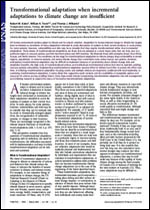 Abstract: All human–environment systems adapt to climate and its natural variation. Adaptation to human-induced change in climate has largely been envisioned as increments of these adaptations intended to avoid disruptions of systems at their current locations. In some places, for some systems, however, vulnerabilities and risks may be so sizeable that they require transformational rather than incremental adaptations. Three classes of transformational adaptations are those that are adopted at a much larger scale, that are truly new to a particular region or resource system, and that transform places and shift locations. We illustrate these with examples drawn from Africa, Europe, and North America. Two conditions set the stage for transformational adaptation to climate change: large vulnerability in certain regions, populations, or resource systems; and severe climate change that overwhelms even robust human use systems. However, anticipatory transformational adaptation may be difficult to implement because of uncertainties about climate change risks and adaptation benefits, the high costs of transformational actions, and institutional and behavioral actions that tend to maintain existing resource systems and policies. Implementing transformational adaptation requires effort to initiate it and then to sustain the effort over time. In initiating transformational adaptation focusing events and multiple stresses are important, combined with local leadership. In sustaining transformational adaptation, it seems likely that supportive social contexts and the availability of acceptable options and resources for actions are key enabling factors. Early steps would include incorporating transformation adaptation into risk management and initiating research to expand the menu of innovative transformational adaptations. Read more ... Abstract: All human–environment systems adapt to climate and its natural variation. Adaptation to human-induced change in climate has largely been envisioned as increments of these adaptations intended to avoid disruptions of systems at their current locations. In some places, for some systems, however, vulnerabilities and risks may be so sizeable that they require transformational rather than incremental adaptations. Three classes of transformational adaptations are those that are adopted at a much larger scale, that are truly new to a particular region or resource system, and that transform places and shift locations. We illustrate these with examples drawn from Africa, Europe, and North America. Two conditions set the stage for transformational adaptation to climate change: large vulnerability in certain regions, populations, or resource systems; and severe climate change that overwhelms even robust human use systems. However, anticipatory transformational adaptation may be difficult to implement because of uncertainties about climate change risks and adaptation benefits, the high costs of transformational actions, and institutional and behavioral actions that tend to maintain existing resource systems and policies. Implementing transformational adaptation requires effort to initiate it and then to sustain the effort over time. In initiating transformational adaptation focusing events and multiple stresses are important, combined with local leadership. In sustaining transformational adaptation, it seems likely that supportive social contexts and the availability of acceptable options and resources for actions are key enabling factors. Early steps would include incorporating transformation adaptation into risk management and initiating research to expand the menu of innovative transformational adaptations. Read more ...
|
McNeeley, S., L. Dilling, et al. (2012), Catalyzing Frontiers in Water-Climate-Society Research: A View from Early Career Scientists and Junior Faculty. Bulletin of the American Meteorological Society 93 (4) 477-484, April. [pdf].
 Excerpt: Changes in the availability and distribution of water have substantial effects on humans and the ecosystems upon which we depend. While we have always experienced variability in the availability of water across a variety of time scales, anthropogenic climate change will likely bring substantial additional effects on water cycles and water resource management, such as changes in timing, amount, and patterns of precipitation; decreasing snow packs; enhanced droughts; and more frequent and intense floods and storms, among others. The scientific community faces the challenge of helping societies plan for climate and water uncertainties in the context of complex and changing socio-environmental processes such as multiple and competing water demands, population growth, land-use changes, and energy extraction and production. Meeting this challenge requires utilizing the strengths of diverse disciplines and working in synergistic collaboration with key stakeholders. Excerpt: Changes in the availability and distribution of water have substantial effects on humans and the ecosystems upon which we depend. While we have always experienced variability in the availability of water across a variety of time scales, anthropogenic climate change will likely bring substantial additional effects on water cycles and water resource management, such as changes in timing, amount, and patterns of precipitation; decreasing snow packs; enhanced droughts; and more frequent and intense floods and storms, among others. The scientific community faces the challenge of helping societies plan for climate and water uncertainties in the context of complex and changing socio-environmental processes such as multiple and competing water demands, population growth, land-use changes, and energy extraction and production. Meeting this challenge requires utilizing the strengths of diverse disciplines and working in synergistic collaboration with key stakeholders.
In the spirit of this effort, a group of 27 junior faculty and early-career scientists, composed of social scientists, atmospheric scientists, and hydrologists, met in Boulder, Colorado, in July 2010 for a Junior Faculty Forum sponsored by NCAR. Expert presentations and discussions focused on adaptation of human societies and water systems to climate change. In this article, the members of this group present a synthesis of our ideas and recommendations for catalyzing scientific frontiers in use-inspired water–climate–society research. Read more ...
Pielke, Jr., R. A. (2012), Chief Scientists Are Not Superheroes. Research Fortnight, March 2. [read online].
Pielke, Jr., R. A. (2012), Guest opinion: The Enduring Importance of Higher Education. Daily Camera March 3. [read online].
Pielke, Jr., R.A., 2012. The Great American Manufacturing Battle, Bridges, Vol. 33, May 25. [pdf].
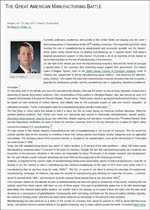 Excerpt: Currently, politicians, academics, and pundits in the United States are arguing over the need for and consequences of innovation in the 21st century economy. One important part of this debate involves the role of manufacturing in employment and economic growth, and the degree to which public policy should focus on treating manufacturing as a “special sector” that deserves targeted government support. In this column, I’ll provide a bit of an overview of this debate and some historical data on the role of manufacturing in the economy. Read more ... Excerpt: Currently, politicians, academics, and pundits in the United States are arguing over the need for and consequences of innovation in the 21st century economy. One important part of this debate involves the role of manufacturing in employment and economic growth, and the degree to which public policy should focus on treating manufacturing as a “special sector” that deserves targeted government support. In this column, I’ll provide a bit of an overview of this debate and some historical data on the role of manufacturing in the economy. Read more ...
Pielke, Jr., R. A. (2012), Post-Normal Science in a German Landscape. Nature and Culture 7 (2) 196-212. [pdf].
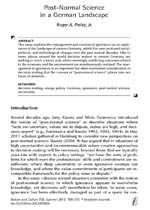 Abstract: This essay explores the management and creation of ignorance via an exploration of the landscape of eastern Germany, which has seen profound social, political, and technological changes over the past several decades. Like in many places around the world decision makers in eastern Germany are seeking to reach a future state where seemingly conflicting outcomes related to the economy and the environment are simultaneously realized. The management of ignorance is an important but often overlooked consideration in decision making that the concept of “post-normal science” places into our focus of attention. Read more ... Abstract: This essay explores the management and creation of ignorance via an exploration of the landscape of eastern Germany, which has seen profound social, political, and technological changes over the past several decades. Like in many places around the world decision makers in eastern Germany are seeking to reach a future state where seemingly conflicting outcomes related to the economy and the environment are simultaneously realized. The management of ignorance is an important but often overlooked consideration in decision making that the concept of “post-normal science” places into our focus of attention. Read more ...
Pielke, Jr., R.A. (2012), Why is Support for Climate Action Dropping? The Interpreter, Lowy Institute for International Policy, June 13. [Read online].
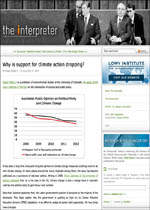 Excerpt: The 2012 Lowy Poll shows that only 36% of those surveyed agreed with the statement that ‘Global warming is a serious and pressing problem. We should begin taking steps now even if this involves significant costs.’ Back in 2006, one year before Kevin Rudd elevated the climate issue to national and international prominence, 68% of those surveyed agreed with that same statement, almost twice as many. Excerpt: The 2012 Lowy Poll shows that only 36% of those surveyed agreed with the statement that ‘Global warming is a serious and pressing problem. We should begin taking steps now even if this involves significant costs.’ Back in 2006, one year before Kevin Rudd elevated the climate issue to national and international prominence, 68% of those surveyed agreed with that same statement, almost twice as many.
But have Australians really gone cold on climate change? The 2012 Lowy Poll shows that 55% surveyed say that their concern about climate change is unchanged since debate on the issue began in Australia, while 38% report being more concerned. Read more ...
Simmons, K., D. Sutter, R.A. Pielke, Jr., (2011), Blown Away: Monetary and Human Impacts of the 2011 U.S. Tornadoes. Chapter 8 in: Extreme events and insurance: 2011 anus horribilis, The Geneva Reports: Risk and Insurance Research (eds.) C. Courbage and W.R. Stahel. [pdf].
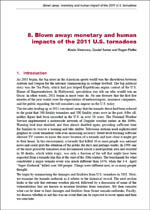 Excerpt: As 2011 began, the big news in the American sports world was the showdown between Auburn and Oregon for the national championship in college football. The big political story was the Tea Party, which had just helped Republicans regain control of the U.S. House of Representatives. In Hollywood, speculation was rife on who would win an Oscar. In other words, 2011 began as most years do. No one foresaw that the first five months of the year would reset the expectations of meteorologists, insurance companies, and the public regarding the toll tornadoes can impose on the U.S. today. Read more ... Excerpt: As 2011 began, the big news in the American sports world was the showdown between Auburn and Oregon for the national championship in college football. The big political story was the Tea Party, which had just helped Republicans regain control of the U.S. House of Representatives. In Hollywood, speculation was rife on who would win an Oscar. In other words, 2011 began as most years do. No one foresaw that the first five months of the year would reset the expectations of meteorologists, insurance companies, and the public regarding the toll tornadoes can impose on the U.S. today. Read more ...
|










